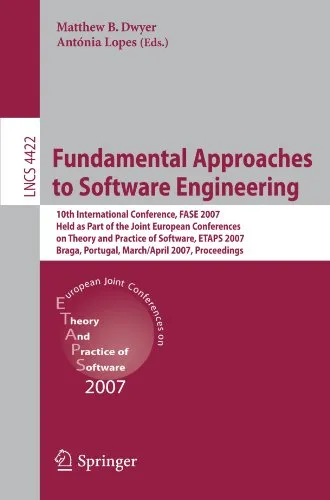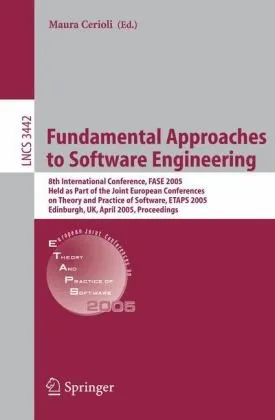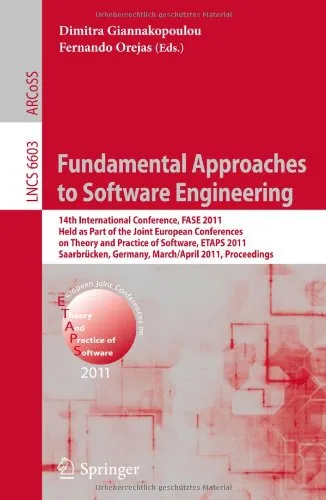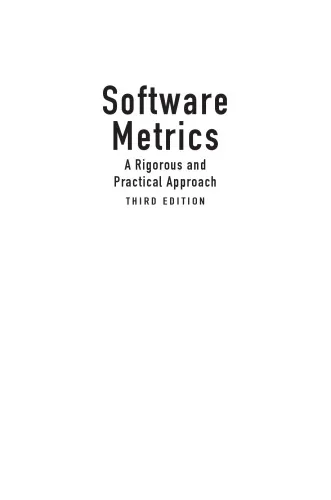Fundamentals of Software Engineering: 5th International Conference, FSEN 2013, Tehran, Iran, April 24-26, 2013, Revised Selected Papers
4.0
بر اساس نظر کاربران

شما میتونید سوالاتتون در باره کتاب رو از هوش مصنوعیش بعد از ورود بپرسید
هر دانلود یا پرسش از هوش مصنوعی 2 امتیاز لازم دارد، برای بدست آوردن امتیاز رایگان، به صفحه ی راهنمای امتیازات سر بزنید و یک سری کار ارزشمند انجام بدینکتاب های مرتبط:
معرفی کتاب
کتاب Fundamentals of Software Engineering: 5th International Conference, FSEN 2013, Tehran, Iran, April 24-26, 2013, Revised Selected Papers مجموعهای ارزشمند از مقالات برگزیده و بازبینیشده است که در پنجمین کنفرانس بینالمللی مهندسی نرمافزار (FSEN 2013) ارائه شدند. این کتاب، موضوعات تخصصی و پیشرفته در حوزه مهندسی نرمافزار را پوشش میدهد و از بحثهای تئوریک گرفته تا کاربردهای عملی و صنعتی را در بر میگیرد. کنفرانس FSEN، که در سال 2013 در تهران برگزار شد، سکویی مناسب برای تبادل ایدهها و مفاهیم نوین بین پژوهشگران و متخصصین این حوزه بوده است.
خلاصه کتاب
این کتاب از چندین بخش تشکیل شده و به موضوعات مختلفی از جمله formal methods، program analysis، software verification و modeling میپردازد. مقالات این مجموعه توسط نویسندگانی برجسته و با تجربیات متنوع در حوزههای آکادمیک و صنعتی نوشته شده است. ویژگی کلیدی این کتاب، ساختاری منظم و محتوایی جامع است که به خوانندگان کمک میکند اطلاعاتی بهروز و قابلاعتماد درباره پیشرفتها و چالشهای موجود در مهندسی نرمافزار به دست آورند.
در این کتاب، به مسائلی نظیر بهینهسازی algorithms، بهبود کیفیت software design، و استفاده از formal methods برای اطمینان از صحت و امنیت سیستمها پرداخته میشود. همچنین، پروژههای بزرگ صنعتی و چالشهای عملیاتی مرتبط با توسعه و نگهداری سیستمهای نرمافزاری پیچیده مورد بررسی قرار میگیرد.
نکات کلیدی
- تبیین روشهای نوین در تجزیه و تحلیل نرمافزار با استفاده از formal verification techniques.
- بررسی استراتژیهای مدلسازی برای سیستمهای توزیعشده و چندعاملی.
- تکنیکهای جدید برای بهبود کیفیت و کارایی software systems.
- ترکیب روشهای تئوریک با کاربردهای عملی در محیطهای صنعتی.
- ارائه راهکارهایی برای مقابله با پیچیدگیهای روزافزون سیستمهای نرمافزاری.
نقلقولهای معروف از کتاب
"Applying formal methods to real-world problems is not just a theoretical exercise; it is a necessity to ensure system reliability in today’s complex environments."
"The bridge between theory and practice emerges when we successfully combine verification models with practical software engineering."
چرا این کتاب مهم است؟
اهمیت این کتاب از جنبههای مختلفی قابل بررسی است. اولاً، این کتاب مجموعهای از جدیدترین پژوهشها و یافتهها در زمینه مهندسی نرمافزار را ارائه میکند که برای محققان، دانشجویان و متخصصان این حوزه بسیار ارزشمند است. دوماً، با تمرکز بر استفاده از formal methods و ترکیب آن با software engineering practices، به حل چالشهای واقعی دنیای امروز میپردازد.
علاوه بر این، مطالب این کتاب موجب درک بهتر و عمیقتر از مفاهیم و تکنیکهای اساسی حوزه مهندسی نرمافزار میشود. بهرهبرداری از این تکنیکها میتواند به توسعه سیستمهای نرمافزاری با کیفیت بالا و قابل اطمینان کمک کند، بهویژه در صنایعی که صحت و امنیت نقش کلیدی دارند مانند هوافضا، بهداشت و درمان، و سیستمهای مالی.
Introduction to "Fundamentals of Software Engineering: FSEN 2013"
Software engineering is a field that continues to evolve rapidly, addressing emerging challenges while creating innovative solutions for complex systems. The book, “Fundamentals of Software Engineering: 5th International Conference, FSEN 2013, Tehran, Iran, April 24-26, 2013, Revised Selected Papers”, serves as a cornerstone in advancing the study and practice of software engineering. Compiled from the carefully selected and revised papers presented at the FSEN 2013 conference, this volume encapsulates essential ideas, breakthroughs, and methodologies that shape modern software engineering practices. Through its rigor and depth, this book provides an invaluable resource for researchers, practitioners, and students.
Detailed Summary of the Book
This book is a compilation of 23 rigorously peer-reviewed papers selected from numerous submissions presented at the FSEN 2013 conference. Each paper has been meticulously revised to enhance its clarity and scientific rigor, ensuring that the book meets the highest academic standards. The topics covered span a broad spectrum of software engineering domains, from foundational theoretical principles to practical applications and advanced tools.
Specific themes include software architecture and component-based development, formal methods and verification, programming languages and analysis, software testing and debugging, and distributed computing systems. These diverse topics highlight how software engineering interfaces with emerging technologies such as cloud computing, mobile systems, and real-time systems.
A key strength of this book lies in its interdisciplinary nature, bringing together concepts from formal methods, systems engineering, and programming to foster an integrated understanding of software development. It also emphasizes model-driven development techniques, workflow optimization, and improving software reliability and security, presenting innovative solutions and research-backed frameworks. By synthesizing these ideas, the book builds bridges between academia and industry, offering both theoretical insights and actionable solutions for real-world challenges.
Key Takeaways
- Understand the foundational principles of software engineering and how they apply to contemporary challenges such as distributed systems and cloud integration.
- Discover the latest developments in formal methods for verification and their application to improving software reliability.
- Learn about practical programming techniques, testing strategies, and debugging tools that create robust and scalable software solutions.
- Explore case studies and research findings that show how theory translates into innovative solutions for industrial concerns.
- Grasp the interplay between software architecture, component-based development, and model-driven approaches in building resilient systems.
Famous Quotes from the Book
"Software systems are not standalone mechanisms; they are organic, evolving structures that must adapt to ever-changing requirements."
"Formal methods are not just tools; they are the grammar through which we communicate precision and rigor in software engineering."
"The coupling of theory and practice is essential, where sound principles inform efficient implementation, and challenges in practice inspire new theories."
Why This Book Matters
The value of this book stems from its dual emphasis on theory and practice, making it relevant to both academic researchers and industry professionals. In an era when software systems underpin critical infrastructure in nearly every domain—healthcare, transportation, finance, communication—having a firm grasp of software engineering principles becomes indispensable. This book equips readers with the knowledge and tools required to develop reliable, maintainable, and efficient systems.
Furthermore, the book embodies the spirit of collaboration and intellectual exchange that drives progress in the software engineering community. By presenting cutting-edge research alongside practical methodologies, “Fundamentals of Software Engineering” not only addresses current challenges but also charts a path for future innovations. Whether you are a seasoned developer, a graduate student, or a researcher seeking fresh perspectives, this book provides the depth and breadth needed to deepen your understanding of the field and inspire your work.
دانلود رایگان مستقیم
شما میتونید سوالاتتون در باره کتاب رو از هوش مصنوعیش بعد از ورود بپرسید
دسترسی به کتابها از طریق پلتفرمهای قانونی و کتابخانههای عمومی نه تنها از حقوق نویسندگان و ناشران حمایت میکند، بلکه به پایداری فرهنگ کتابخوانی نیز کمک میرساند. پیش از دانلود، لحظهای به بررسی این گزینهها فکر کنید.
این کتاب رو در پلتفرم های دیگه ببینید
WorldCat به شما کمک میکنه تا کتاب ها رو در کتابخانه های سراسر دنیا پیدا کنید
امتیازها، نظرات تخصصی و صحبت ها درباره کتاب را در Goodreads ببینید
کتابهای کمیاب یا دست دوم را در AbeBooks پیدا کنید و بخرید
1241
بازدید4.0
امتیاز0
نظر98%
رضایتنظرات:
4.0
بر اساس 0 نظر کاربران
Questions & Answers
Ask questions about this book or help others by answering
No questions yet. Be the first to ask!
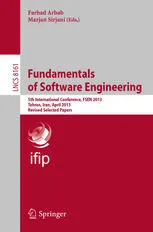




![Fundamentals Of Software Engineering, 5Th Ed [Paperback] Mall](https://s3.refhub.ir/images/thumb/Fundamentals_Of_Software_Engineering__5Th_Ed__31573.webp)

